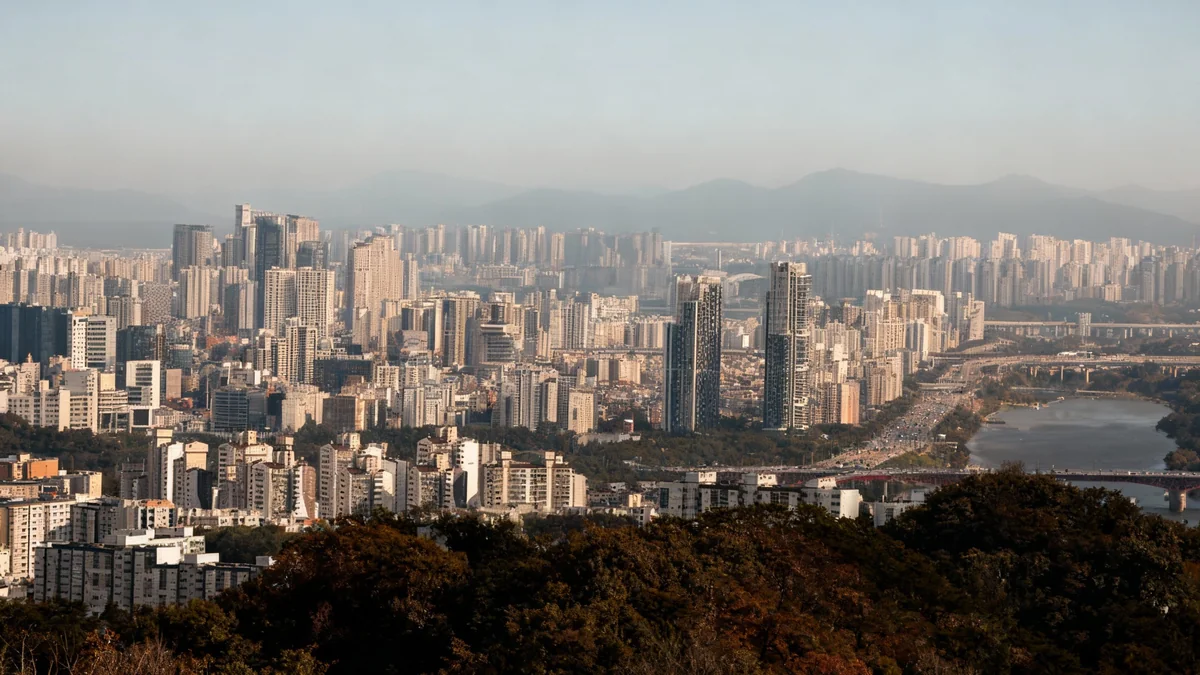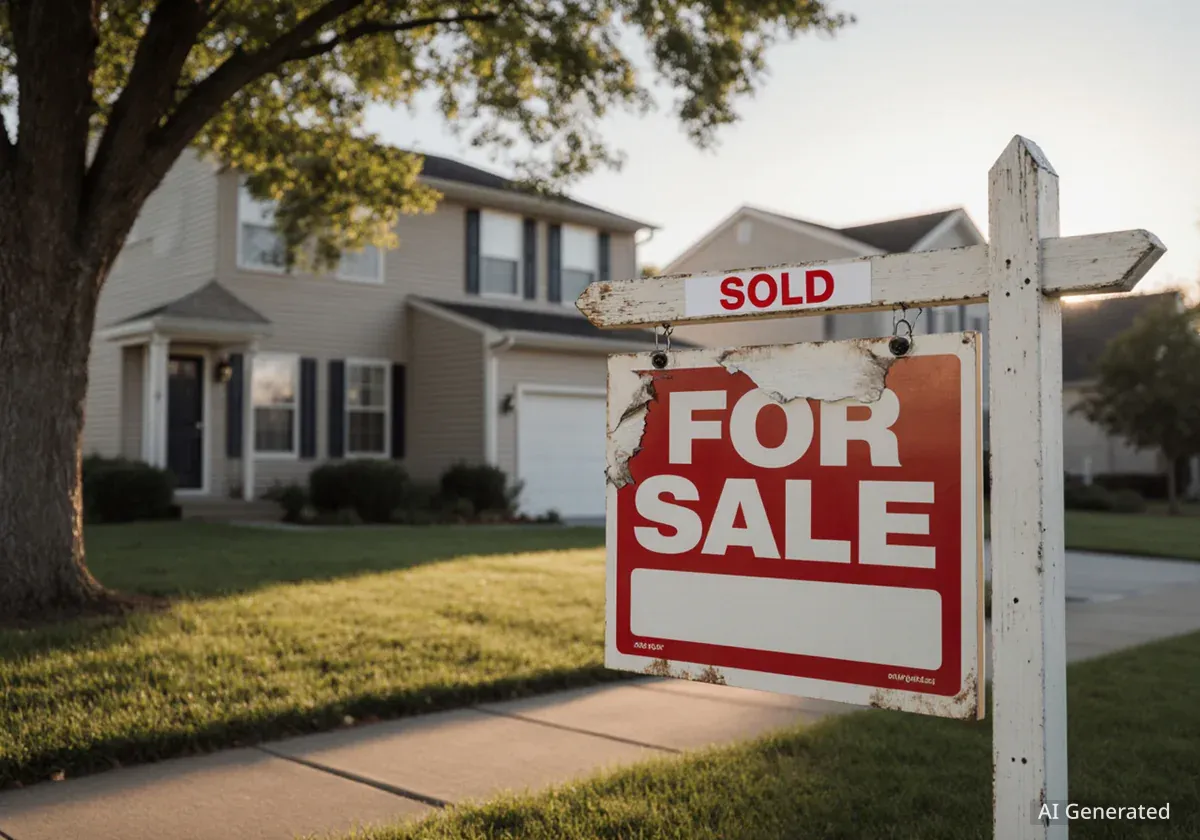The South Korean government's latest attempt to cool its overheated housing market, announced on October 15, is facing significant criticism from experts and the public. The new measures, which include expanding regulated zones and tightening mortgage limits, are seen as insufficient to address the fundamental drivers of soaring property prices in Seoul and surrounding areas.
Critics argue the policy fails to impact wealthy cash buyers, contradicts the government's expansionary fiscal strategy, and offers little relief for non-homeowners, raising concerns about its long-term effectiveness and potential negative side effects for renters.
Key Takeaways
- On October 15, the government designated all of Seoul and 12 Gyeonggi regions as land transaction permit zones and tightened loan rules.
- The policy is criticized for its inability to curb demand from wealthy, cash-based investors who do not rely on mortgages.
- Experts point to a conflict between the government's attempts to restrict real estate demand while simultaneously injecting large amounts of money into the broader economy.
- The measures lack fundamental reforms, such as changes to property and transfer taxes, which could reduce the investment appeal of high-end real estate.
- Concerns are rising that the policy could unintentionally harm the rental market and non-homeowners without stabilizing prices.
New Regulations Meet Widespread Skepticism
Just four months into President Lee Jae-myung’s term, his administration has rolled out its third major real estate policy aimed at curbing rampant price growth. The measures, detailed on October 15, are extensive. The government has designated the entire city of Seoul and 12 key regions in Gyeonggi Province as land transaction permit zones, speculative overheating zones, and adjustment target areas.
Alongside these zoning restrictions, the policy significantly tightens lending. For homes in the capital region priced between 1.5 billion and 2.5 billion won, the mortgage loan limit has been cut from 600 million won to 400 million won. For properties exceeding 2.5 billion won, the limit is now just 200 million won, down from 600 million won.
Despite these seemingly aggressive steps, the consensus among market analysts is that the policy will likely fail to achieve its primary objective of stabilizing the market. Public frustration is also mounting, as ordinary citizens face new hurdles in moving or securing loans, while the expectation of long-term price hikes remains.
Conflicting Economic Signals
A primary criticism of the new policy is its direct conflict with the government's broader economic strategy. Housing prices are fundamentally tied to supply and demand, which are heavily influenced by the amount of money circulating in the economy. When liquidity is high, asset prices, including real estate, tend to rise.
A History of Monetary Expansion
This issue is not new. The previous administration under President Moon Jae-in initiated deficit budgets and expanded fiscal spending, a trend that accelerated during the COVID-19 pandemic with sharp interest rate cuts. This flood of liquidity was a major factor in the rapid escalation of housing prices. A similar pattern emerged in 2024, leading to a second wave of highly leveraged home purchases, known as "yeongkkul."
President Lee Jae-myung's administration has continued a similar path of fiscal expansion. Shortly after his inauguration in June, he announced a large-scale fiscal deficit, injecting a record amount of capital into the economy. While the stated goal is to stimulate corporate investment and production, many investors anticipate that this money will inevitably find its way into high-return, low-risk assets like apartments in Seoul's affluent Gangnam district.
This creates a paradoxical situation where the government is attempting to suppress real estate demand with one hand while fueling it with the other through expansionary monetary policy.
Loopholes for Wealthy Investors
Perhaps the most significant flaw in the October 15 measures is their limited impact on affluent buyers. The new mortgage restrictions are irrelevant to individuals or corporations who can purchase property with cash and do not require bank financing.
While the overall volume of real estate transactions may decline, the policy does little to prevent price-setting deals among the wealthy. These high-value transactions often create a benchmark that pulls up prices in the surrounding market, a phenomenon known as the "key-matching" effect. If prices for luxury properties continue to climb, mid- and lower-tier markets are expected to follow suit.
"The deepening polarization of housing prices due to the preference for ‘one solid property’ stems from excessive tax reductions on capital gains. The transfer tax system must be reformed."
Real estate experts argue that to effectively cool the market, policies must reduce the expected return on investment for high-end properties. This could be achieved through several mechanisms:
- Expanding the supply of new and existing homes.
- Setting loan interest rates higher than the expected rate of property appreciation.
- Increasing the tax burden on property acquisition, holding, and sale.
The current policy relies heavily on loan restrictions but neglects these more fundamental tools. Notably, there are no new measures related to transfer taxes or property taxes, which are considered highly effective in curbing speculative investment.
A Market Driven by Investment Psychology
The government's strategy also fails to address a major cultural shift in the housing market. For younger Koreans, particularly the MZ generation (millennials and Gen Z), property is viewed less as a home and more as a primary investment vehicle.
Real Estate as an Asset Class
According to Park Won-gap, a senior real estate expert at KB Kookmin Bank, "The MZ generation, now a dominant force in the housing market, views apartments as investment products, trading them like stocks." This mindset fuels a constant drive to upgrade to more expensive, higher-potential properties.
As long as high-end apartments in prime locations are perceived as high-return, safe-haven assets, the trend of leveraged buying will persist. For many, the potential capital gains from buying a 3-billion-won apartment that could sell for 6 billion won in a decade far outweigh the risks and costs associated with interest payments and taxes.
From this perspective, the current policy of restricting movement and limiting loans is seen as a temporary obstacle rather than a long-term deterrent. Without structural changes to the tax system that diminish these massive potential returns, the underlying investment demand is unlikely to wane.
Fundamental Flaws and Missing Safeguards
Lack of a Long-Term Vision
Experts point out that rising housing prices and soaring household debt are two sides of the same coin, with mortgages comprising the bulk of household liabilities. To foster a healthier economy, they argue, liquidity needs to be redirected from real estate into more productive sectors like technology and biotech. This requires a fundamental shift in policy that makes holding excessively expensive property a financial burden rather than a path to wealth.
However, the October 15 measures lack this transformative vision. There are no provisions to encourage owners of high-value homes to sell, which would increase the supply of existing homes on the market.
Impact on Non-Homeowners
A crucial oversight in the new policy is the lack of consideration for non-homeowners and young people. The primary goal of housing policy should be residential stability, yet these regulations may have adverse effects. For instance, the requirement for buyers in land transaction permit zones to reside in their purchased property for two years effectively removes these units from the rental market. This reduces the supply of `jeonse` (lump-sum deposit) rentals, forcing more tenants into the more expensive monthly rental system and increasing their cost of living.
Political Pressures and Market Uncertainty
Ultimately, many analysts believe the policy's shortcomings are rooted in political calculations. With local elections scheduled for next June, the Lee administration and the ruling Democratic Party of Korea are likely hesitant to implement more drastic—and potentially unpopular—measures like significant tax hikes. Such policies could alienate affluent homeowners, a key voter demographic.
This approach suggests a prioritization of short-term political stability over long-term market health. As a result, while the market may see a temporary dip in transaction volume, the core issues of excessive liquidity and high investment expectations remain unaddressed, pointing toward a potential resurgence in prices in the near future.





